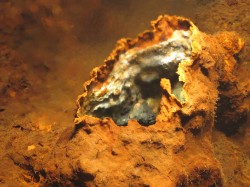Extraordinary Discovery in the mid-Atlantic Ocean
Telmo Morato, ATLAS principal investigator at IMAR–UAz, who is leading the expedition’s ROV dives, commented “this is just fantastic!”. The newly discovered site, located on Gigante Seamount at 570 m depth and approximately 100 km from Faial island, is remarkable given its accessibility compared to other hydrothermal vent systems. This relative ease of access could present a unique opportunity for scientists to discover more about these areas of high biological and mineral richness, which are like an oasis hidden in the deep ocean. Hydrothermal fields are poorly understood so far, mainly due to most vent fields discovered to date being difficult to access, but they are important for their relative high biological productivity in the deep ocean, often hosting complex communities. The discovery was made using the Portuguese ROV “Luso”, which is capable of diving to a depth of a staggering 6,000 m. Luso makes it possible to map deep-sea benthic communities inhabiting hydrothermal fields, such as this one, as well as seamounts in the region. The newly discovered hydrothermal vents have built up distinctive chimneys on the seafloor through which warm waters rich in carbon dioxide are discharging. The team at sea have seen evidence that bacteria are growing in great numbers around these vents and are likely to support a specialised food chain. These chemosynthetic organisms don’t need light to make their food and can support diverse ecosystems in the dark depths of the deep Atlantic. The scientists on this expedition have also deployed baited cameras around the seamounts to attract pelagic fish and dived the Luso late at night to capture migration patterns, allowing us to better understand the biodiversity of the region. The valuable information provided by these dives will aid the sustainable management of deep-sea ecosystems and maintain the wealth of services the ocean provides us. Currently, only 3% of the ocean is protected, and the ATLAS team onboard are gathering vital information to understand whether these vent ecosystems meet the criteria of being Vulnerable Marine Ecosystems (VMEs) as agreed by the United Nations Food & Agriculture Organisation. This unexpected discovery is a huge step forward for deep-sea exploration and the better understanding of these largely untouched ecosystems. Professor Murray Roberts, ATLAS project coordinator at the University of Edinburgh, said “This just shows how little we know about the deep sea, the largest ecosystem on our planet. Hydrothermal vents not only form oases of life in the deep ocean, but research over the last 20 years has shown the minerals they release also have important consequences for life throughout the ocean. As plans to mine deep sea minerals are developed around the world it’s absolutely essential we understand these relationships to protect the oceans and the support functions they provide to all life on Earth.” Notes for Editors: ROV footage from the expedition is available for use by the media. To request access to the video taken at the vent ecosystem, please contact the ATLAS Project Office (EU-Atlas@ed.ac.uk). Scientists and crew on board two vessels, the Santa Maria Manuela and the Portuguese Navy surveillance ship NRP Almirante Gago Coutinho, sailed from Horta, Faial on 3 June. The expedition will visit six islands of Portugal’s Azores archipelago (including Corvo, Flores and Pico), surveying coastal and abyssal waters, before concluding on 23 June. Journalists are welcome to visit the ship at Horta, Faial, Azores on 23 June and attend a press conference on 24 June. For more information on this event, the Blue Azores programme and the Oceano Azul Foundation, please contact Emanuel González (egoncalves@oceanoazulfoundation.org), Cristina Carranca (ccarranca@oceanoazulfoundation.org) or Telmo Morato (t.morato@gmail.com).
Keywords
Science, Research, Hydrothermal field, vents, New Discovery
Countries
Austria, Belgium, Bulgaria, Cyprus, Czechia, Germany, Denmark, Estonia, Greece, Spain, Finland, France, Croatia, Hungary, Ireland, Italy, Lithuania, Luxembourg, Latvia, Malta, Netherlands, Poland, Portugal, Romania, Sweden, Slovenia, Slovakia, United Kingdom



